Prime Minister Modi & Lee Hsien Loong in Singapore bilateral talks
Prime Minister Narendra Modi held high level bilateral talks with Singapore Prime Minister Lee Hsien Loong in Singapore, on his second day of his tour.
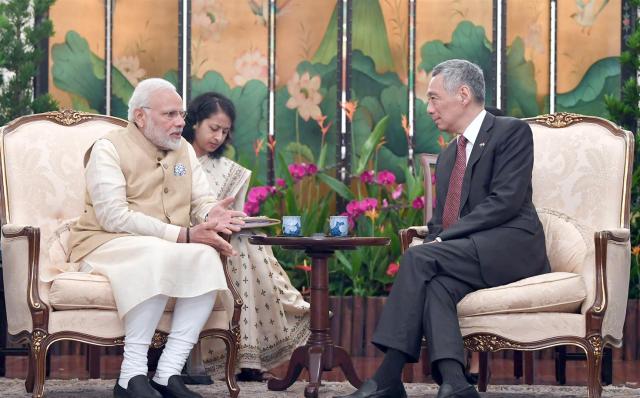
A gamut of strategic, economic and technological issues figured during their talks. Several MoUs were signed. Prime Minister expressed gratitude to Singapore’s PM and said he has always made untiring efforts towards strengthening relations with India.
Earlier in the day, the Prime Minister was accorded ceremonial welcome at Istana, the official residence of Singapore President.
After the bilateral talks, India and Singapore will sign and exchange agreements and MoUs in areas of higher education, capacity building, defence, urban infrastructure, people to people contacts among other things followed by a joint statement.
He will call on Singapore President Halimah Yakub and visit Nanyang Technical University and interact with Students. Later, Mr Modi will deliver key-note address in the 18th Shangri La dialogue, a global platform that discusses security related issues in the Asia Pacific region .
Mr Modi who is the first Indian leader to deliver a key note address at this international forum, is likely to emphasis on India’s perspective on security concerns in this region.
He is expected to focus on geopolitical issues in the region, particularly highlight the role that India could play in stabilising the security of Asia and its waters
Prof. B.N. Goswamy lecture SOME ASPECTS OF TIME

National Museum, New Delhi added an event.
The lecture will be delivered by Prof. B.N. Goswamy, a distinguished art historian. His talk titled ” SOME ASPECTS OF TIME: The Indian Painter and His Work” will reflect on the handling of time by Indian painters of the past. As noted by Prof. Goswamy, those painters work, reflects on thier being completely at home with the notion of time as manipulable and elusive.

WED, 6 JUNE AT 18:00

You like National Museum, New Delhi
Jug Cerovic is an architect and mapmaker on Delhi Metro
Jug Cerovic is an architect and mapmaker, his map is a pretty rendition of the Delhi Metro #DelhiMetro

THIS IS WHAT HAPPENS WHEN A BLACK HOLE GOBBLES UP A STAR
At the center of our galaxy resides a Supermassive Black Hole (SMBH) known as Sagittarius A. Based on ongoing observations, astronomers have determined that this SMBH measures 44 million km (27.34 million mi) in diameter and has an estimated mass of 4.31 million Solar Masses. On occasion, a star will wander too close to Sag A and be torn apart in a violent process known as a tidal disruption event (TDE).
These events cause the release of bright flares of radiation, which let astronomers know that a star has been consumed. Unfortunately, for decades, astronomers have been unable to distinguish these events from other galactic phenomena. But thanks to a new study from by an international team of astrophysicists, astronomers now have a unified model that explains recent observations of these extreme events.
The study – which recently appeared in the Astrophysical Journal Letters under the title “A Unified Model for Tidal Disruption Events” – was led by Dr. Jane Lixin Dai, a physicist with the Niels Bohr Institute’s Dark Cosmology Center. She was joined by members from University of Maryland’s Joint Space-Science Institute and the University of California Santa Cruz (UCSC).
As Enrico Ramirez-Ruiz – the professor and chair of astronomy and astrophysics at UC Santa Cruz, the Niels Bohr Professor at the University of Copenhagen, and a co-author on the paper – explained in a UCSC press release:
“Only in the last decade or so have we been able to distinguish TDEs from other galactic phenomena, and the new model will provide us with the basic framework for understanding these rare events.”
In most galaxies, SMBHs do not actively consume any material and therefore do not emit any light, which distinguishes them from galaxies that have Active Galactic Nuclei (AGNs). Tidal disruption events are therefore rare, occurring only once about every 10,000 years in a typical galaxy. However, when a star does get torn apart, it results in the release of an intense amount of radiation. As Dr. Dai explained:
“It is interesting to see how materials get their way into the black hole under such extreme conditions. As the black hole is eating the stellar gas, a vast amount of radiation is emitted. The radiation is what we can observe, and using it we can understand the physics and calculate the black hole properties. This makes it extremely interesting to go hunting for tidal disruption events.”
In the past few years, a few dozen candidates for tidal disruption events (TDEs) have been detected using wide-field optical and UV transient surveys as well as X-ray telescopes. While the physics are expected to be the same for all TDEs, astronomers have noted that a few distinct classes of TDEs appear to exist. While some emit mostly x-rays, others emit mostly visible and ultraviolet light.
As a result, theorists have struggled to understand the diverse properties observed and create a coherent model that can explain them all. For the sake of their model, Dr. Dai and her colleagues combined elements from general relativity, magnetic fields, radiation, and gas hydrodynamics. The team also relied on state-of-the-art computational tools and some recently-acquired large computer clusters funded by the Villum Foundation for Jens Hjorth (head of DARK Cosmology Center), the U.S. National Science Foundation and NASA.
Using the model that resulted, the team concluded that it is the viewing angle of the observer that accounts for the differences in observation. Essentially, different galaxies are oriented randomly with respect to observers on Earth, who see different aspects of TDEs depending on their orientation. As Ramirez-Ruiz explained:
“It is like there is a veil that covers part of a beast. From some angles we see an exposed beast, but from other angles we see a covered beast. The beast is the same, but our perceptions are different.”
In the coming years, a number of planned survey projects are expected to provide much more data on TDEs, which will help expand the field of research into this phenomena. These include the Young Supernova Experiment (YSE) transient survey, which will be led by the DARK Cosmology Center at the Niels Bohr Institute and UC Santa Cruz, and the Large Synoptic Survey Telescopes (LSST) being built in Chile.
According to Dr. Dai, this new model shows what astronomers can expect to see when viewing TDEs from different angles and will allow them to fit different events into a coherent framework. “We will observe hundreds to thousands of tidal disruption events in a few years,” she said. “This will give us a lot of ‘laboratories’ to test our model and use it to understand more about black holes.”
This improved understanding of how black holes occasionally consume stars will also provide additional tests for general relativity, gravitational wave research, and help astronomers to learn more about the evolution of galaxies.
Further Reading: UCSC, Astrophysical Journal Letters
Hillary: Naresh, it’s been a big month for Democrats

Naresh, it’s been a big month for Democrats.
Half of the women running in House primaries have won their races so far, thanks in no small part to the work of our friends at Emerge America. Young, diverse candidates endorsed by Run for Something have continued to win at nearly five times the usual rate for first-time candidates. At least six Swing Left candidates have come out on top, and two District Attorney candidates in North Carolina won after Color of Change mobilized tens of thousands of voters.
Meanwhile, Collective PAC, the Arena, and the rest of the groups that Onward Together partners with have worked tirelessly to get progressive voters inspired and engaged. And I’m just as thrilled as anyone that, thanks in part to our partner groups and thousands of passionate volunteers, Stacey Abrams won her primary earlier this month — and became the first black woman to be a major party nominee for governor in the history of our country.
This month, Onward Together celebrated our first anniversary. I can’t believe how much we’ve accomplished together in just one year, and I’m looking forward to another year of fighting for our progressive values alongside you.
But we can only grow if this team continues to step up. Please make a contribution today to become an official member of Onward Together:
| Thank you. I hope you’re as proud as I am.Hillary |
Launch of guidelines for adventure Tourism

Naresh Kumar Sagar
@Nksagar
·
10h
Sagar Media Inc. – Launch of guidelines for the adventure Tourism.(link: https://youtu.be/xUfFBjusY1g) youtu.be/xUfFBjusY1g
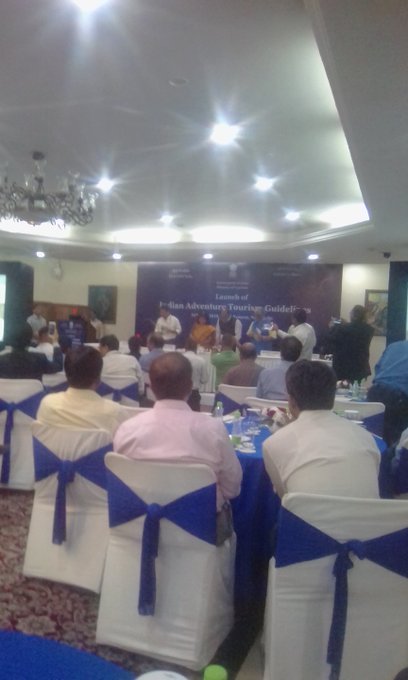

Naresh Kumar Sagar
@Nksagar
·
14h
Sagar Media Inc: These days experiential is buzz for tourists and look for adventure . Secretary GOI Rashmi said was there traveling for Buddhist. Tourism the foreign asked us adventure Tourism.
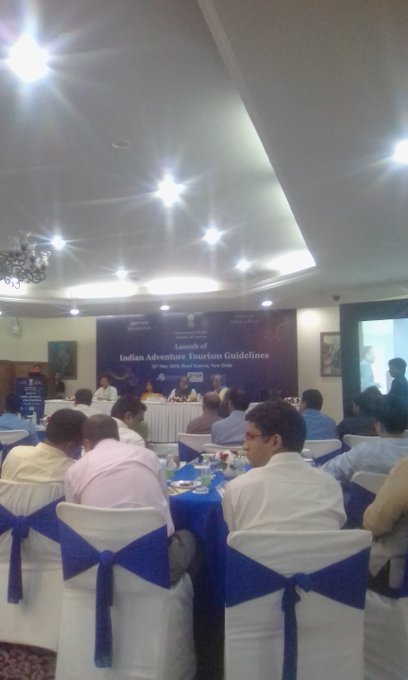

Naresh Kumar Sagar
@Nksagar
·
14h
Sagar Media Inc : International year of Adventure Tourism is 2018- Launch of Indian Adventure Tourism Guidelines at Ashoka hotel New Delhi
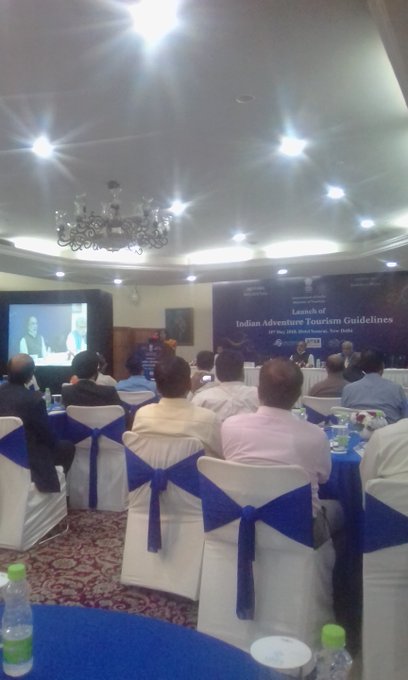
Tourism Minister K J Alphons launched the Government guidelines on adventure tourism in India. with 50K adventure tourism provider in travel and tourist sectors, 8ks-Km of coastal lines, 70% of Himalayan range within Indian territory, ks of heritage destinations are all assets for the adventure tourist guidelines launch.India the oldest civilization with four main religions Hindu,Budhism, Jainism and Sikhism is best to visit the religious fervor.
Releasing the guidelines in New Delhi yesterday, Mr Alphons said, India has immense potential for adventure tourism ranging from the Himalayas to the coastal regions. He said, these guidelines are a beginning to building adventure tourism in India.
AIR correspondent reports that these guidelines on safety and quality norms have been formulated along with the Adventure Tour Operators Association of India in an effort to make adventure sports safer.
The aim of this initiative is to help adventure tour operators understand and execute safety guidelines in a better manner. These guidelines cover land, air and water-based activities which include mountaineering, trekking, bungee jumping, paragliding, kayaking, scuba diving, river rafting and many other sports. The guidelines codify the standard operating procedures and instructions for risk mitigation and emergencies as well as provide for details like safety precautions, training required and insurance. It covers the role of a guide, important equipment required, inspections and maintenance process, operating instructions and medical safety and others.
Denmark ban face veil
Naresh Kumar Sagar

@Nksagar
·
7m
Sagar Media Inc: Denmark ban face veil.#Denmark passes banon #Islamic full-face veil in public spaces, following Belgium, France, Netherlands, Bulgaria and parts of Switzerland.
Denmark voted to ban burqa, thus the fifth European country to pass such a law.
Lawmakers voted 75-30 in favour of the legislation which had been put forward by the governing centre-right coalition.
Law bans any full-face garment, if there is no ‘recognisable purpose’ for wearing it, such as cold weather or complying with laws such as wearing helmets on motorcycles.
Politicians insist the law does not target any religion, but it has become known colloquially as the ‘burqa ban’. Headscarves, turbans and Jewish skull caps will not be affected by the law.
Justice Minister Soeren Pape Poulsen said that it will be up to police to use their ‘common sense’ when enforcing the law, which will apply from August 1.
First-time offenders risk a fine of 1,000 kroner (£118). Repeat offenses could trigger fines of up to 10,000 kroner (£1,180) or a jail sentence of up to six months.
Amnesty International has called the ban “a discriminatory violation of women’s rights.
Englishmen fear to speak in (link: http://Britain.US) Britain.USEx Ambassadors call Trump’s tariff silly act. EU Mexico Canada to retaliate measured on steel Aluminum.S Secretary of state Pompedo still uncertain of US Trump Kim Summit.
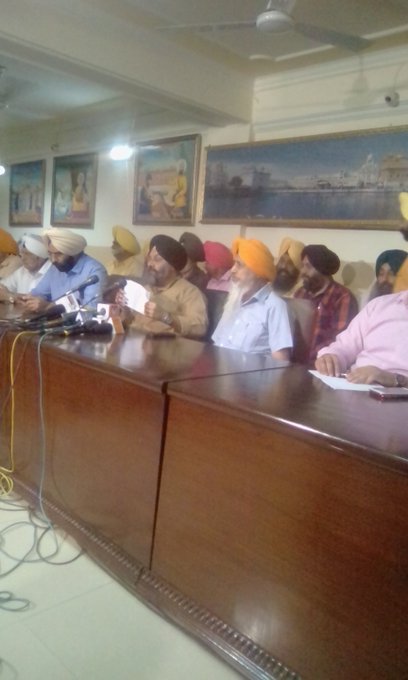

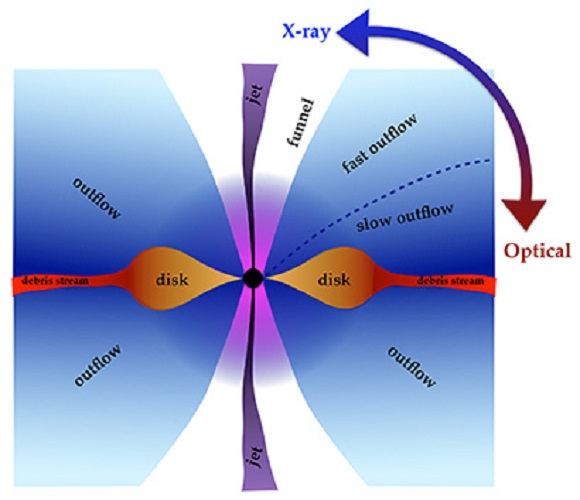
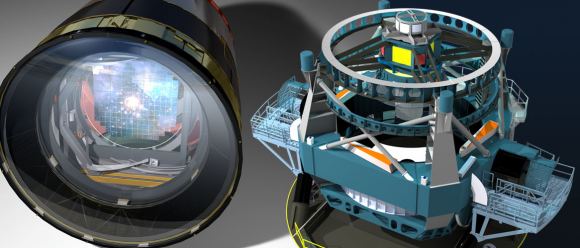
No comments:
Post a Comment